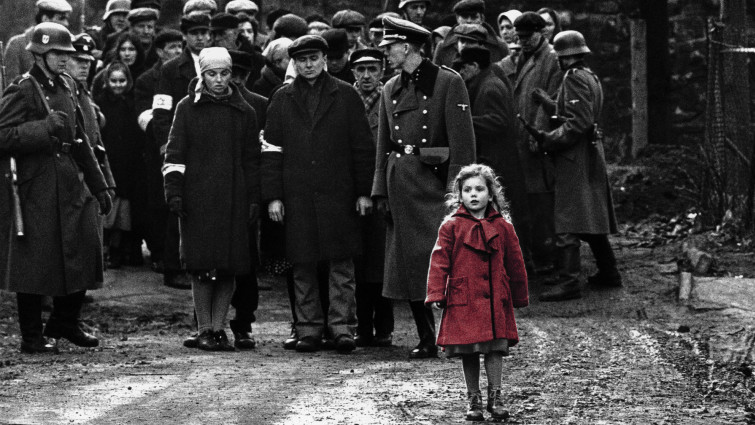

Member review

Schindler's List
Powerful drama based on true events about a powerful German businessman who helped Jews being persecuted by the Nazis in World War Two.
Certificate
Duration187 mins
Review by
-
 Ethan, 15
Ethan, 15 - 3 reviews
A Man Who Saves One Life, Saves The World
During World War II, perhaps the most horrific event in human history, German industrialist Oskar Schindler came to Krakow in the hopes of making his fortune, through his charm, lies and deception, he left, having saved the lives of over 850 Jews. Based on a book of the same title, but telling a series of true events, the story of Oskar Schindler is one of change and determination, as at the start he was nothing more than a handsome playboy, but when the credits role as we look down his grave, he is one of God’s honest men. Written by Steven Zailliam but directed and produced by the iconic Stephan Spielberg, who made sure this film stuck to the mark. Starring Liam Neeson in what is perhaps his best and most iconic role, other notable cast include Ben Kingsley and Ralph Fiennes. This film makes us question the morality of humanity, for not all monsters hide underneath the bed.
Before I go any further, I am no historian, if i get any names, dates, events or places incorrect I apologise. During the height of World War II, a greater tragedy was taking place, away from the front lines, the Holocaust. The Jews were rounded up, many taken away from their families, and forced to work within concentration camps. However one man, Oskar Schindler (Liam Neeson) arrived in Krakow, a German city, to make his fortune. He acquired Jewish Official Itzhak Stern (Ben Kingsley), to help him set up his factory via his underground connections as well as find him workers, specifically, Jewish workers, as they cost less. However Stern purposely gets as many Jews as possible who they now are desitin for the concentration camps, Oskar does not mind, as long as he gets paid, however his heart when he first hand witnesses the liquidation of Jews, ordered by Amon Goth (Ralph Fiennes) Oskar changes his mission from fortune, to saving as many lives as possible.
Monumental in what Spielberg is able to acoimsih within the runtime of this film, it never feels like it is dragging or is slowing down, every moment and character in this film is needed for the plot. Often in historical films, they are required to cut out a lot, this film does not. Each actor brings something to each character to make them feel like they were real, Liam Neeson portrayal of the smooth talking playboy, with a heart of gold is to perfection, respectfully portraying this man. But perhaps the most interesting character and perhaps conternestial, Schindler’s complete opposite, Amon Goth (Ralph Fiennes). Masterfully portrayed by Ralph Fiennes, who is no stranger to portraying ruthless dictators, he portrayed Voldemort in Harry Potter. Amon Goth is your stersypical Nazi, cold, heartless, and hates Jews. The actual man of Amon Goth is a cold blooded leader, overseeing the construction and use of the concentration camp. I will not define this horrible man, only look at his portal. Through the middle half of the film, we grow to hate him, killing Jews without reason and brutalizing his maid. However in the portrayal event we see his torture as he starts to feel romantically infatuated with his maid, fighting between his heart and his beliefs. Ultimately though, his love is drowned within his hate. He symbolises evil whilst Oskar, who starts out, not evil, but certainly not good, as he transforms into a good man.
Oskar Schindler's progression through the film is slow, subtle, but clear, but perhaps to me his best scene is his relation of what is happening. In the middle part of the film, he discovers what happens to the Jews that were taken away, and it changes him as he vows to see these people, although he already felt pity through them, this put him over the edge, and the final scenes of this film show us what he was able to do. As we see Schindler's Jews, alongside their actors, stand by his grave and honour him. His friendship with Stern as well, is perhaps what the film is best about. Stern starts out seeing what Oskar is trying to do, and finds cracks within his plan to save as many lives as possible, later changing Oskar all together. He is the definition of a hard worker.
The soundtrack is most epic, conveying the sense of loss but yet hope that the film tells. Of course the musical mastermind John Williams is behind it. The way the film is shot is also most amazing, having been filmed in black and white, which is very strange, but very effective. Colourised films were a thing by this time, so his choice to film it in black and white, allowing us to see the world from their view, that there is no grey, only good and bad. It is the way Schindler sees the world. The way he sees the Jews. Workers, not people, until the liquidation of the jews, during which he sees the little girl in the red coat. He stops seeing them as workers, and now, he sees the girl as a human, the red coat. Later in the film when he sees it again, this time, burned, he knows what he must do, the innocence of the Jews seen within the little girl. In the red coat.
The film ultimately tells the most marvouless and hopeful story in the most hopeless time, telling the story away from front lines, a story about a man, he came with nothing more than a nice suit, a inheritance, and a smile on is face, he gains the trust of the powerful figures, allowing him a factory and workers, workers who were ordered to be killed. The Jews. The man sorted them as only workers, until he saw them dead, seeing them as equal people, and not a mindless mob that must die.